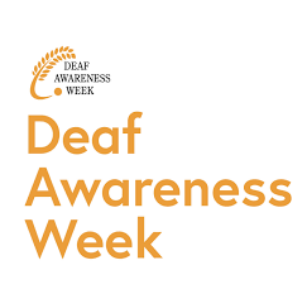
Deaf Awareness Week takes place this year from the 4th-10th May. The theme this year is ‘acquired deafness’. This means a loss of hearing that was not present at birth but happens some time during a person’s life.
D/deaf people are more likely to experience mental health difficulties compared to hearing people. CNTW have a Mental Health and Deafness Service based at Walkergate Park in Newcastle; we work with D/deaf and deafblind people aged 18 years or older who have mental health problems. This week we are hoping to raise awareness of what our service does.
There are about 12 million people in the UK who are D/deaf or hard of hearing, or one in six people. This is set to rise; Action on Hearing Loss estimates that by 2035, the figure will be around 15.6 million, or one in five people. It is important that we are aware of the barriers the deaf population face, especially when providing health care.
It is estimated there are more than 100,000 D/deaf people within the UK whose first or preferred language is BSL (British Sign Language). However, unlike other minority language groups, D/deaf people cannot be assumed to be fluent in their ‘own’ language (sign language), as this may not have been accessible to them as children. Language problems may also be a symptom of a mental health problem such as thought disorder or dementia.
Although we mostly work with BSL users, we also accept referrals for people with acquired deafness who are struggling to access mainstream mental health services. Working with individuals and their support teams, we can adapt communication, resources and information to promote accessibility and support staff to work with people in a meaningful and effective way.
Our team’s work can have a really big impact on peoples’ care. For example, we were recently delighted to get this letter from the sister of someone we work with, praising our team member Donna:
“When I first met Donna I just thought, another person making promises that won’t be kept – my sister had been massively let down by a lot of people involved in her care. However, Donna set out to gain trust and to build a relationship with my sister and worked immensely until she got that.
“Donna actually gave me a better understanding of my sister’s deafness, and this is making a massive difference in how I communicate with my sister. She also provided so much information to staff around getting them to understand her deafness. Donna’s still working immensely hard, putting training in place to help with my sister’s care plan.
“Donna helped me in a lot of ways cope with how unwell my sister’s been. It’s been the hardest thing I have ever had to deal with. She’s been on the end of the phone anytime I’ve found myself struggling – she truly is an amazing lady.”
- Book a double appointment to allow time for interpretation. Professional, qualified and registered interpreters should be arranged for appointments, using the D/deaf person’s preferred interpreter. The interpreter should also have experience in working in mental health settings, as there can be a risk of an interpreter attempting to make sense of someone who is thought-disordered. Interpreter bookings in CNTW can be made online at https://www.dalanguages.co.uk/
- When sending appointment letters, provide the option to use text messaging and email to contact the team; please do not ask D/deaf people to ring a number
- Make sure you have the person’s attention before you start speaking
- Places with good lighting and less background noise are best for conversations
- Use your normal volume, lip movements and facial expressions; you don’t need to exaggerate or raise your voice
- Check whether the person understands what you are saying, and if they don’t, try another way of communicating it – never say ‘don’t worry about it’ and move on
- Learn some basic finger spelling or BSL phrases. This PDF from Action on Hearing Loss is useful: it introduces the fingerspelling alphabet and some useful phrases and words.
